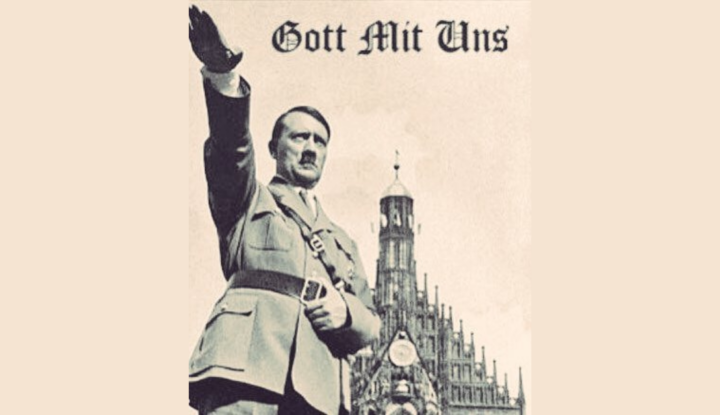Last week I attended the UK’s national ceremony to mark the 80th anniversary of VE Day. Because the UK is constitutionally a Christian state, this took place in Westminster Abbey under the auspices of the Church of England. (The Blair and Brown governments often had more secular ceremonies in addition, but since 2010 the Church of England has become the default again and it looks like the new Labour Government is keeping that up, unfortunately.)
In the Abbey I was allocated the seat I am usually allocated and the same one I had at the Coronation – in the “Other Religions” section in the North Transept, but in a separate row to show that I am not actually from a religion. Although the ceremonies are obviously Christian in the Abbey, they are sometimes about as inclusive as they can be, with readings from different people. But not this time! This was full on prayers, hymns, and a lot of godly readings.
It sparked many reflections in me as I sat and stood there not praying. The first was how the Church of England is changing. Far from the more reserved institution some might recall, it appears increasingly evangelical, often leveraging its privileged position to assert its message, even when the stated aim is national unity.
But it was the address by the Archbishop of York that really took me aback, particularly his characterisation of the fight against fascism:
“This war was also fought in the pursuit of ideas about who we are as human beings and ideals about what sort of world we wanted to live in. These ideas do not exist in a vacuum. They come from the Judeo-Christian tradition… Dear friends, this is good news for the world. It saves us from chaos and oppression and from ourselves. Nazism systematically determined to destroy all this. A brutal and godless ideology had swallowed Germany whole and was now consuming Europe as well. We fought against these evil ideas. We knew that they mustn’t prevail. And that sometimes as a last resort we knew that such evil had to be opposed by force.”
Why was I shocked? For two reasons. Firstly, it is straightforwardly false in a way that I didn’t think any serious person would attempt – the Nazis were far from godless, and the war against fascism was emphatically not a battle of Christian ideals against godlessness. Secondly, more alarmingly, I think embracing this fiction actually disarms us in the ongoing struggle against authoritarianism today.
I don’t want to spend too much time on the first part (not least because a perennially useful post by Coel Hillier is so good on the Christianity of the Nazis) but here are just a couple of examples:
- Like Germans, in general, most Nazis were at least culturally Christian. 94% of the population declared themselves Christian in the 1939 census and Church attendance rates were higher than England’s.
- Most SS members were Christian: SS records from Auschwitz show that its members overwhelmingly identified as Catholic (43%) or Protestant (37%), or “theist” (20%). Himmler himself declared, ‘I have never tolerated an atheist in the ranks of the SS. Every member has a deep faith in God.’
- Hitler repeatedly said he was a Christian saying for example, “My feeling as a Christian points me to my Lord and Savior as a fighter” and “Secular schools can never be tolerated because such schools have no religious instruction… all character training and religion must be derived from faith.’ He called Christianity the ‘unshakable foundation of the moral and ethical life of our people.’
- The Third Reich banned atheism. Far from being godless, one of the Nazis’ early actions upon seizing power was to dismantle and outlaw atheist and humanist organizations. The German Freethinkers League, with 500,000 members, was shut down in 1933. Hitler announced: ‘We have undertaken the fight against the atheistic movement… we have stamped it out.’
And of course, everyone knows that Nazi antisemitism didn’t come from nowhere. It went with the grain of a deep pre-existing Lutheran and Roman Catholic anti-Jewish sentiment: Christian antisemitism. The historical record shows that Nazism was not an ideology devoid of God, but one that, for many of its adherents and leaders, coexisted with and even championed a form of Christianity.
Equally, to claim that what motivated the anti-fascist side was Christian values is nonsense. The ideals of freedom, democracy, peace, human equality, and the rule of law have multiple sources – Christian, pre-Christian, non-Christian, and post-Christian – and people of many different creeds argued and fought against fascism in the 1930s and 1940s. Just one non-Christian example can be given from the Annual General Meeting of today’s Humanists UK in 1939:
“We believe peaceful solutions of all international problems are possible. Fascism, glorifying war as the supreme achievement of mankind, denies this. We believe in individual freedom, the right of all to self-development according to one’s highest ideals. Fascism seeks to enslave mind and body… We believe in the equality of men and women. Fascism believes in the subjection of woman to man. We believe in the worship of truth and goodness. Fascism believes in the deification of one man, the ‘Leader’. Surely there can be no more urgent claim on us to-day than to fight against this monstrous thing… Otherwise, it seems civilisation must go down in blood and tears.”
This humanist stance, rooted in reason and shared human values, provided (as it still provides) a powerful ethical framework against authoritarianism, independent of religious belief for many people at that time.
Why This Historical Distortion Matters Today
The Archbishop’s misrepresentation is not merely an untruth. It has implications for how we confront the rise of authoritarianism in our own time. If we falsely believe that World War II was a straightforward victory of “Christian values” over godlessness, we risk overlooking the true nature of fascism and limiting the resources we can draw upon to fight it.
As German author Joachim Kahl, born in the 1940s, observed in his mid-twentieth century book The Misery of Christianity, those who claim to think that ‘Christianity’ is automatically a good thing, immediately hit the problem that in most matters there are Christians on both sides:
“In the name of Christ, Protestant pastors belong to fascist groups. In the name of Christ, Catholic bishops sympathise with the aims of neo-Nazis. As a Christian, it is possible to be either a loyal communist, or a fanatical anti-communist. As a Christian, it is possible to preach pacifism or to give one’s blessing to the production and the use of the atomic bomb.”
Christianity offers no inherent counterpoint to authoritarian ideologies. History shows it can be, and has been, invoked to support them.
To effectively combat fascism today, we need a clear-eyed understanding of its historical manifestations and its ideological flexibility. Relying on a simplistic narrative of religious good versus godless evil not only distorts the past, it narrows our vision and weakens our coalition for the future. The fight against authoritarianism requires a broad front, drawing on the deepest ethical commitments of humanists, people of diverse faiths, and all who cherish freedom, reason, and human dignity. Misremembering the past won’t help us save the future.

